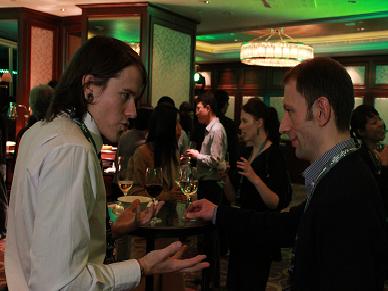Kaspersky aims for breached Aussie firms

analysis Data breaches and lousy malware detection rates are just what Moscow-based Kaspersky Labs needs to crack the Australian corporate market.

Kaspersky COO Eugene Buyakin, right. (Credit: Darren Pauli/ZDNet Australia)
That's because everyone has antivirus and new corporate customers won't change their vendor unless something breaks, slows to a crawl or gets stolen.
But there's plenty of examples of that happening.
Kaspersky is even willing to send its clean-up forensic crew to fix wrecked systems free of charge and help provide companies sign up to them.
It's not a promise easily found in written form, but it's a commitment unanimously agreed by company chiefs.
Essentially, Kaspersky is hoping companies will be dissatisfied with their security vendor when their update cycle comes around — either over performance issues or over being infected by a virus or because of antivirus' tendency for false positives.
Poaching customers is a necessary strategy for a company fighting a super-saturated market. This is especially true for a company considered for years to be geeky, sporting a bevy of Russian tech-heads with a sentience that seems to lie outside the conventional security vendor psyche. And this approach will spearhead its attack on the big security vendors.
Managers tell me the company is privy to some serious data breaches involving big companies with big reputations, but of course they wouldn't give details. Still, they assert that the victims, former customers of rival vendors, are now counted in Kaspersky's burgeoning customer base, which includes law enforcement and governments from around the world.
"The security market is saturated, but we are making headway. And the only way we can do that is to take business from the big guys," corporate business vice president Keith Maskell said of the company's strategy down under.
The company is comparatively new to the Asia-Pacific, having only set up a local shop three years ago in Hong Kong under regional boss Harry Cheung, who once owned a fish 'n' chips shop in Drummoyne, NSW.
Kaspersky's local presence idled for a couple of years while it relied on distributors and some seemingly sporadic big-ticket sponsorships including the Formula One Ferrari cars and the AFL Demons.
"What is a Kaspersky?" I hear AFL fans ask.
However, the vendor is now making a concentrated push into the region, releasing seven versions of its enterprise antivirus engine 8.0 (Linux, Windows Server Enterprise Edition, Linux File Server, Lotus Domino, Microsoft Threat Management Gateway, Internet Security and Accelerator Server Security for Microsoft Exchange Servers) into the Asia-Pacific market at the end of next month.
So who is Kaspersky?
Opting for function over form, Kaspersky is a company that venerates its geeks. Kaspersky has about 2000 staff spread across 29 countries and its 10 board members are the same engineers that founded the company. It has increased its research and development engineer headcount by fourfold to 800 over three years and it also openly states that it pays more attention to developing its malware engines than bolt-on functions (ie, it hates add-ons).
Commander-in-chief and co-founder Eugene Kaspersky and many of his cohorts are free of the usual droll media-savvyness, and impart opinions forged thousands of miles away, both geographically and socially.
Founder Eugene Kaspersky and one senior Kaspersky manager have gone on record saying that they don't believe in cyber war. Claiming rumours of Mafia-controlled hacker gangs are bogus, Eugene Kaspersky says he won't out of practice, not principle, hire a black hat.
Chief operating officer Eugene Buyakin said the company is growing 38 per cent year-on-year and has some 7 per cent of market share in the Asia-Pacific, up from under 5 per cent in 2008. It pulled in some US$580 million in GAAP revenue FY2010, up from US$390 million last year.
"The next growth will be in corporate. That where our future is and where we want to be over the next five years," Buyakin said.
(Credit: Kaspersky Labs)
"Now we are known mostly as a company that produces very strong consumer security products, but it's not the whole truth."
He puts the company within the top three vendors for consumer security, but the tale is different in the corporate space.
Kaspersky wants to change all of that, planning for the corporate space to churn the lion's share of profit by 2015.
When asked if the company was ripe for sale, Buyakin said not in the "foreseeable future". He did, however, concede that it would be a good buy.
If Intel has success with its recent McAfee buy and if other vendors are snapped up by large companies, Kaspersky may find it difficult to compete in a world of megaliths.
So where is the future for the vendor? Being consumed by IBM? Or dominating the market and then consuming IBM? No one knows for sure.
Is there even a place for antivirus in a world where desktops are replaced with mobile phone docks and cloud services? Buyakin is reticent to predict, but it is obviously troubling.
To him, the industry will be radically different in the next five years as it undergoes what he sees as the biggest shift in its history: security moving from protecting data to protecting users, creating new products and killing others.